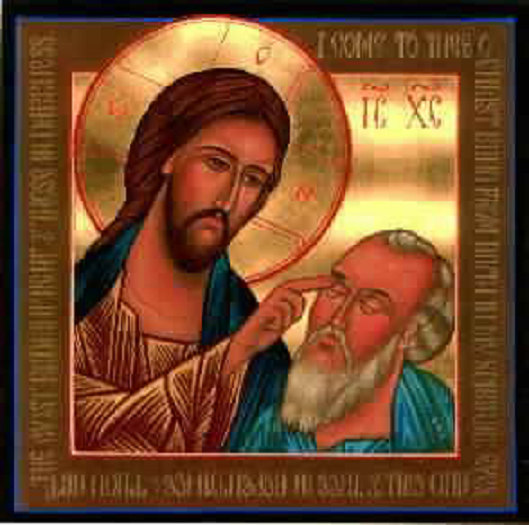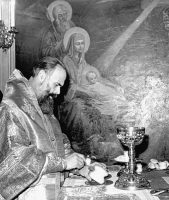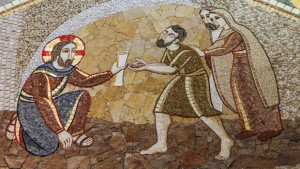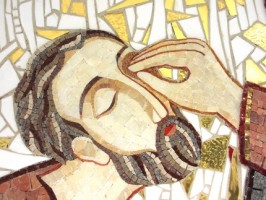I am never out as late at night as I am after the Pascha liturgy and the party that follows. In the midst of that dark night, Pascha is a light shining in the darkness and blindness of this world. Around midnight, one candle is lit, and the priest chants, “Come receive the light from the Light that is never overtaken by night, and glorify Christ Who is risen from the dead.” Then we all light our candles, exit the church, sing His resurrection, and glorify His victory over death as we enter into the beauty of a brightly lit church. The Pascha service is truly a glorious experience.
But if we limit the bright light of Pascha to that service or even to a 40-day season, we will have missed the point. For in Christ’s resurrection, our Lord brings light to the entire world. He restores sight to the blind and gives life to the dead. He opens the darkest tomb to the brilliant light of life eternal. The light of His resurrection floods the entire universe.
But we must not rest content with general statements about the light of Christ, for we are all to be illumined by Him to the very depths of our hearts and souls. Like the man whom Jesus Christ healed in today’s gospel text, we are all blind from birth: held captive by the corruptions of death, our passions, and the accumulated weight of human sin all around us. We have worshipped the creature, especially ourselves, instead of the Creator. We have looked for fulfillment in the vanity of life: money, power, pleasure, appearances, impressing others, and getting our own way. We find it easy to think only of ourselves and our will, but so hard to live with the humility and selfless love of Christ. We define ourselves over against other people, and build ourselves up by putting them down and harboring resentment. So much of our life has been a wandering in darkness and we may have despaired of things ever getting any better. At times, we may not have the eyes to see any light at all.
The good news of Pascha is that, in Christ, we may pass over from this living death to life eternal. The spiritual blindness of our souls may be healed. If we develop the eyes to see it, we may leave behind our slavery to sin, our addiction to the passions, the distortion of ourselves that we have brought about. We may rise up from these darkened, pointless ways of living to the light, truth, and joy of the kingdom of heaven. We may share in Christ’s eternal life, in His victory over sin and death, even now.
But we have to be honest with ourselves: it is much easier to remain in the darkness than to move into the light. Just as our eyes need time to adjust when we leave a movie theater and walk into the sunshine of a summer day, the eyes of our souls are not cleansed in an instant. Our salvation is not a magic act, but requires our intentional, patient cooperation with the grace of the Great Physician. There is simply no alternative to perseverance, to accepting bravely the tension and struggle that we experience when we expose our darkened souls to the healing light of Christ, and to mindfully turning away from temptations of whatever kind.
There is too much in all of us that prefers the darkness to the light. We are all quite comfortable with some of our sins and passions. We have gotten used to them and may have accepted the lie that we are justified in doing so out of honesty, out of being true to ourselves. Just as a blind person may cope quite well with a lack of vision and get used to navigating the world in darkness, we may have become experts in how to justify our actions, condemn others, and keep God on the margins of our life. All too often, we have become too well adjusted to our own spiritual darkness.
Now there may be something to be said for being psychologically well adjusted, but our faith is not about coping well with the darkness. It is about being illumined by the Light of the world, about participating in the brilliant new day of the resurrection, about sharing in the glory of life eternal. Our goal is to shine with the light of God, like an iron in the fire. Of course, no one of us is worthy of such a transition from death to life and no one of us has achieved it perfectly. Indeed, to think of our life in Christ as an achievement is a mistake, for we share in the great blessing of the Lord’s victory over death by His mercy, not our accomplishment.
But if we are not doing all we can to open the dark places of our lives to the light of Christ, we are abusing His mercy, using the hope of forgiveness as an excuse not to cooperate with the Lord’s healing. Our Savior told the blind man to go to a pool and wash. The man did and he was healed. Too often, we do not obey the clear instructions that Christ has given us for our spiritual healing: to love God with every bit of who we are and to live our neighbors as ourselves; to forgive those who have wronged us; to serve the poor, sick, and needy with every bit of attention that we should show to the Lord Himself; to close our eyes and ears to temptation; to shut our mouths when want to stay say something hateful; and to focus on our own failings instead of those of others.
As we near the end of the season of Pascha, we should all wrestle seriously with the question of whether we are really doing what we can to open ourselves to the light of Christ. Are we obeying the Lord’s instructions on how to find healing in our souls? Are we keeping a close watch on our thoughts and disregarding those that tempt us to sin? Are we following a rule of prayer and fasting that reorients our daily life toward God and helps us find healing from our passions? Are we preparing faithfully to receive our Lord’s Body and Blood in the Holy Eucharist each Sunday? Do we take confession regularly and ask for the forgiveness of others whenever we wrong them?
Finding healing from our spiritual blindness is no more complicated—no harder or easier—than living the basic Christian life that we all know we should live. There are no secret codes or handshakes; no one is required to achieve heights of asceticism that are beyond his or her ability; no one should try to become some kind spiritual super hero. The brilliant light of Pascha shines on us all and we must learn to accept the course of our lives, no matter how painful or disappointing, as our path to the Kingdom. Despite differences in life circumstances and personalities, we all have the same kind of work to do: bit by bit, step by step, opening the eyes of our souls to a light so bright that we think it will blind us. But there is the irony: we are already blind. The light of Christ comes not to blind, but to give sight; not to condemn, but to save; not to kill, but to bring life eternal.
At the end of this glorious season of Pascha, let us all open our eyes and souls to the light of our Lord, Who is never overtaken by night, and glorify Christ who is risen from the dead. May this Pascha provide us not only with memories of beautiful services and rich food, but more importantly with personal participation in the brilliant light of Kingdom of God, shining in the dark places of our lives, illuminating every dimension of who we are, and drawing us ever more fully into the life of the One Who has conquered death and sin. He alone is our salvation and our hope. For Christ is Risen!




















